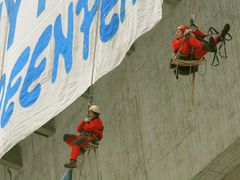Prunéřov - Czech Greenpeace activists "occupied" a smokestack of the North Bohemia's soft coal power plant Prunéřov in a protest against greenhouse gas emissions earlier this week.
The organisation warned that Prunéřov, owned by Czech energy giant ČEZ, produces 8,9 million tons of carbon dioxide every year.
"If protection of the climate is to continue even after the Kyoto protocol expires in 2012, things need to be settled now, at the UN Climate Change Conference in Bali," said Jan Rovenský, the chief of energy and climate campaign of the local Greenpeace branch.
The EU's 12th biggest polluter

According to the World Wide Fund for Nature (WWF), Prunéřov is the 12th most environment-unfriendly plant in EU, excluding the new member states Romania and Bulgaria.
"Prunéřov, the ČEZ's largest coal-based source of energy, produces only few per cent smaller amount of carbon dioxides than all the Czech private cars altogether," warned the Czech environmental organization Hnutí duha (Rainbow Movement).
ČEZ is planning to close the older part of the plant - Prunéřov 1 - in years 2015 and 2016. Prunéřov 2, the object of the latest protest, is going to experience a profound modernization in 2010-12 with the aim of increasing its productivity.
"With emissions reduced significantly, we expect the plant to drop to the bottom of the WWF's rankings," informed Ladislav Kříž, the spokesman of ČEZ.
"We find it irresponsible to jeopardize health and lives in a facility that is taking concrete steps towards improvement, and we are surprised by Greenpeace having such different values," said Ota Schnepp, the spokesman of ČEZ for the North Bohemian region, commenting on the environmentalists' action.
The company refrained from using force against the activists and so far it is not considering a legal complaint either.
Activists: Modernization is useless
Greenpeace warned that the level of Prunéřov plant's productivity is only 32 per cent. In other words, it takes too much coal to produce a kilowatthour of energy, hence the plant releases higher amount of exhalations during the process.
After the upgrade, the plant is supposed to have the productivity of 37 per cent - still insufficient, says Greenpeace, reminding that modern coal plants' productivity is higher at least by one quarter.
We don't agree with the whole idea of extending life of these obsolete soft-coal plants from the communist era, since this practice has already claimed lives of tens of North Bohemian villages," said Jan Piňos from Greenpeace.
"If we are to prevent the worst impact of climate change, the world has to halve the current level of global carbon dioxide emissions, which means as far as 80 per cent reduction in industrialized countries," said Piňos.
Minister of Environment Martin Bursík generally shares this view - he opposes the modernization of antiquated plants and is concerned about the innovated blocs' low productivity (read: more pollution). ČEZ, however, claims that they have used the most modern treatment available for such facilities.

